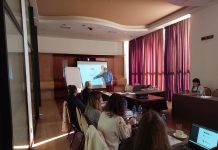The Georgia-NATO relationship dates back to the 1990s when Georgia started to participate in the program “Partnership for Peace“ and became one of the founders of the Euro-Atlantic Council. Georgia was involved in the NATO peace operation in Kosovo from the very beginning following which it also took part in the NATO peace operation in Afghanistan.
Despite this activity and engagement, Georgia could hardly claim to have any exceptional relationship with NATO, as the Alliance had with a number of post-Soviet countries, until 2002. At the same time, NATO had already established bilateral standing committees with Russia and Ukraine which implied a qualitatively higher level of relationship between the NATO and these countries than with Georgia.
A step forward in Georgia-NATO relations, and generally in the implementation of the Euro-Atlantic course which is followed by our country, was made at the Summit of the Euro-Atlantic Co-operation Council in Prague in November 2002 which was preceded by the NATO Summit at which time Georgia officially declared its willingness to become a member of the Alliance from the highest tribune. In early 2003, Georgia proceeded to the development of an Individual Partnership Action Plan (IPAP) designed to carry out reforms aimed at integration into NATO. The Plan was accomplished in 2004 with its implementation starting the same year. Although the Georgian party had set the end of 2006 as a deadline for its completion, this Plan is still underway. The IPAP performance is appraised by the NATO Evaluation Mission which comes to Georgia several times a year to prepare reports. Unfortunately, however, these reports have hitherto not been made available for the general public insofar as they were “restricted” by NATO itself. A member of the Evaluation Mission, however, promised the author of this report that the document would be made public starting from January 2008. In September 2006, NATO and Georgia initiated a procedure of “intensive dialogue” and the Georgia-NATO standing commission was established in September 2008. At the 1999 Washington Summit, NATO decided that an interested applicant state must have its Membership Accession Plan (MAP) accomplished prior to accession. The undertaking of this process as a part of Georgia’s integration into NATO will be discussed below.
Excessive Expectations
The political team which came to power in 2004 set out NATO integration as one of its medium-term priorities. High officials were persistent in their declarations that Georgia would begin to implement the MAP as soon as 2006 and would become a member of NATO in 2008 (although ignoring the necessary invitation from NATO to join). NATO officials, including the Evaluation Mission members, repeatedly advised NGO representatives, the general public and, naturally, representatives of the Government that it was in conflict with the Alliance’s practice to specify any dates and terms for a next milestone of accession and, moreover, that it might have a negative effect in terms of deteriorating attitudes towards NATO membership inside the country. This was what the NATO PA Secretary General, Pierre Lellouche meant in his 2006 Report on Georgia in which he warned against excessive expectations to the extent to which they may possibly cause disappointment in the population.
This article does not aim to find out what urged the Government to come up with such unrealistic promises as concerns NATO membership. We may, however, discuss the effect that the propaganda policy of the Government of Georgia had upon the people’s attitudes towards NATO membership as produced by the results of the 2008 plebiscite. The CEC announced that Georgia’s accession to NATO was supported by 61 percent of the participants in the plebiscite. This appeared as a kind of drawback as compared to the results of an interrogation which was conducted ten months earlier when the share of NATO supporters was 82 percent. Following this, the CEC published the “corrected” data taking account of the opinion of people living in the Kvemo Kartli region which increased the share of supporters to 72 percent.
A further example of the excessive expectations which are found in the country is the Government’s interpretation of the summary report of the NATO Summit in Bucharest. By means of its strong propaganda machinery, the Government assured the Georgian people that this forum would allow the country to begin to implement the MAP although, in fact, this did not happen with NATO only promising Georgia that it would one day become a member of the Alliance. This appears to be just another promise that the doors of NATO are always open for Georgia — as for any other European state which is willing to become a member and which meets the NATO criteria — whilst beginning the MAP implies only the beginning of the accession procedure without any further formal commitment from the Alliance.
Impediment to Integration
Both experts and the general public entertain many considerations as to what is impeding Georgia’s integration into NATO. Notwithstanding that there may be many factors hampering its further approximation towards the Alliance, we have classified these factors into three groups in order to have a better understanding of the problems at hand. These are:
1. Georgia’s difficult relationship with Russia.
2. Unresolved conflicts.
3. Undeveloped democracy in the country.
Such a grouping is dictated by the nature of the comments and recommendations expressed in either verbal declarations or in various written documents concerning Georgia and NATO. Being neither the ambition of the below analysis, it is very difficult to determine which of these factors has more weight.
Difficult Relationship with Russia
NATO high ranking officials and leaders of its member states have mentioned more than once that countries seeking membership in the Alliance should have good relations with their neighbours. On one hand, this requirement may sound unfair for Georgia since reciprocal relations are established by mutual will and Russia has declared that it will do its best to prevent Georgia from joining NATO whilst continuing to follow its own interests of openly “hunting” Georgia over the past two decades. In view of this reality, achieving good neighbourly relations with Russia implies something which is above the power of Georgia and the setting down of such conditions may suggest that this is simply an attempt to find some pretext upon which to refuse Georgia’s membership in NATO. It is our hope, however, that this is not the case. There are European members in the Alliance which have to settle accounts with Russia for more-or-less known reasons but there are also those states which are ready to fight for Georgia, together with the Americans, and which have proved this more than once. We think that by pursuing such inconsistent and often confrontational policies v. Russia, which may be easily perceived as “pouring fat on the fire,” we are damaging the arguments of our supporters and providing counter-arguments for our opponents. The West expects Georgia to have a civilised approach even towards such an unpredictable and aggressive state as Russia. Instead, however, we have proven to be unpredictable ourselves as was demonstrated most recently during the events of August 2008. For a country like Georgia, however, the establishment and maintenance of a normal relationship with Russia remains extremely difficult if not impossible. It is in our power to demonstrate to the world that the blame for this lies squarely upon Russia whilst we are doing everything possible to have a normal relationship.
Unresolved Conflicts
Perhaps no other events or tendencies have ever caused so much damage to Georgia on its way to NATO as the August war in 2008. In 1995, NATO adopted a document entitled Study on NATO Enlargement which, amongst other things, mentioned that “states, which are involved in ethnic disputes or territorial disputes outside the state, including disputes related to irredentism, or in domestic disputes related to jurisdiction, must settle such disputes in a peaceful way in compliance with OSCE principles prior to becoming members.” As in the case of relations with Russia, settlement of the conflicts involves both parties working together with the existing situation concerning Abkhazia and South Ossetia suggesting that the heads of these separatist regions, under the patronage of Russia, would prefer to maintain the current state of affairs or worsen the situation. This again means that the key to Georgia’s further integration into NATO rests in the hands of third parties. This is not the case, however, insofar as it suffices to show both NATO and Western leaders that Georgia is irreversibly fixed in its position towards a peaceful means for the settlement of the conflict. Moreover, the requirement of successive irrevocability was expressed which means that such an irrevocability should also be proven by the future Georgian government. Let alone the other government, but the present government has proved which, in fact, has only done the contrary. Even if many in the West have forgotten the events in the Tskhinvali Region in July 2004, the persistent war propaganda, rhetoric and the events of August 2008 have given rise to certain doubts concerning Georgia’s capability to conduct negotiations and evade conflict situations. In the point of view of our Western partners, it could be said that Georgia’s being caught in Russia’s perfectly executed trap in August 2008 was a kind of test which it failed to pass.
Undeveloped Democracy in the Country
The situation of an undeveloped democracy in Georgia is one which we are absolutely in a position to eliminate. Many NATO documents, in fact, refer directly to this situation in Georgia such as the abovementioned report by Pierre Lellouche, in the form of a summary of the 2006 NATO Summit, noting that the Alliance expects more progress in “political, economic and military spheres, including the implementation of judicial reform.” Experts have paid immediate attention to the fact that the need for political reforms was named in the first place let alone being accompanied by direct recommendations for judicial reform. Herein it is also worth mentioning that both NATO and our Western partners consider the reforms which were carried out in the military sphere as the most successful as compared to the others. Given that the military budget spending accounted for almost one-forth of the 2007 state budget of Georgia, one may suggest that the Government of Georgia is making a special focus upon the military sphere as it proceeds along its way towards NATO integration. Another example of this is Georgia’s increasing participation in the operations of the anti-terrorism coalition. On the one hand, the Government seems unwilling to pursue democratic reforms whilst trying to gain the favour of NATO through military achievements and, on the other hand, proving its loyalty to Western partners by increasing its participation in joint operations. Although the Study on NATO Enlargement indicates that participation in the joint operations of the Alliance is one of the determinants in the integration process of the country, we believe such a one-sided approach to be less effective. Building up powerful military machinery compatible with NATO does not compensate for viable and well-functioning democratic institutions either for Georgian citizens or for NATO. The events of August 2008, however, cast serious doubts upon the military efficiency of the Georgian army, including the capacities of both army commanders and their reservists although this article does not aim at considering these issues herein. Lellouche’s summary report of the 2008 NATO Summit in Bucharest mentions that the Parliamentary elections in Georgia are also of interest to NATO with its conclusions relying upon the reports of observers from international governmental and non-governmental organisations since NATO itself does not send observer missions to participate in elections. Most likely, NATO evaluates the Georgian Parliamentary elections of 21 May 2008 primarily upon the information contained in the OSCE/ODIHR report of 7 September 2008 which is, however, quite unfavourable for Georgia. This was suggested by the visit of the NATO Secretary General to Georgia in September 2008 when he criticised the general situation of democratic development in the country and the Parliamentary elections of 21 May.
What is the Way Out?
• The Government of Georgia should not create excessive expectations regarding the terms of the country’s integration into NATO. The population should have an explicit and clear understanding that this integration depends exclusively upon Georgia’s achievements in respective spheres and not upon the terms of accomplishment of one or another milestone plan. Georgia will not be able to become a member of the Alliance unless it succeeds in producing the required outcomes. Referring to Cold War examples (Turkey and Portugal) is counter productive as they do not fit into the contemporary policy context but only create groundless expectations inside the country. The events of August 2008 demonstrated that people may experience a disappointment towards the West and a feeling of abandonment — and, in particular, towards NATO — because of the excessive expectations and being constantly misled as concerns NATO membership.
• Confrontation with Russia inflicts damage upon Georgia’s integration into NATO. Even if gaining points in the eyes of the leaders of some states, which are especially hostile towards Russia, this only keeps us away from NATO. The events of August 2008 crowned Georgian-Russian relations which had been deteriorating gradually over the last years. The degree to which Russia’s image suffered from this incursion is less interesting since Georgia’s image did not benefit from this either. Georgia should establish a successive non-confrontational relationship with Russia which would be maintained within a civil framework irrespective of Russia’s behaviour.
• It is necessary to fundamentally change the approach towards the settlement of the conflicts. Georgia will not be admitted into NATO unless it finally excludes a coercive approach from those employed in conflict settlement. After August 2008, it will be very difficult for Georgia to demonstrate that it will remain upon a peaceful way towards this end. It is necessary to put an absolute end to any war rhetoric, prohibit the propaganda of the return of the territories by force and explain to the Georgian people that NATO is not the organisation which would use force to restore the territorial integrity of Georgia. Flexible diplomacy should be made part of any peaceful processes, irrespective of their format, whilst also conducting dialogue directly with the separatist governments.
• As a means of improving Georgia’s somewhat tarnished image after the events of August 2008, the best and quickest way towards integration into NATO is to build up viable, well-functioning and democratic institutions. This is a sphere in which we are not dependent upon external factors and are in the position to show positive trends in the shortest period of time.
Shalva Pichkhadze,
\”Crisis in Georgia, 2008. Preconditions, Reality, Perspectives\”,
Independent Experts\’ Club













